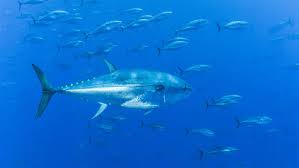By Pita Ligaiula at COP28 in Dubai, UAE
Marshall Islands head of delegation and Minister for Natural Resources John Silk, Monday highlighted the important role of tuna in his country’s economy during a panel discussion on the sidelines of COP28 in Dubai.
The event focused on the impact of climate change on fisheries, particularly in the Pacific region.
“Tuna is a central part of the Marshall Islands’ revenue and the rest of us in the Pacific. Of course, Tuna is really important to us,” said Silk.
“Before COVID, we were raking in about US$40 million a year in revenue from selling licensed to fishing companies to come and fish. So, it’s no question – without revenues, we will be in trouble. I know that we got funding from other sources, but we still have to maintain Tuna; that means conservation.”
Silk emphasised the significance of nearshore fishing for local communities in Marshall Islands.
“Nearshore fishing is very important for the local communities throughout the Marshall Islands. That’s where they get their main sources of food from the water.”
Concerns were raised about the impact of climate change on fisheries.
“When the water continues to warm, there will be problems with nearshore fishing because then the fish might die off, or they can’t get the nutrition they need to grow and produce.
“When the water continues to warm, the fish might migrate somewhere else. If they go out into the high seas, we have no control. Outside the high seas, fishing companies can take whatever they want, and there’s nothing that we can get revenue from. I’m suspecting that some of the biggest emitters also have some of the biggest fishing fleets,” he emphasised.
Dr Manu Tupou-Roosen, the Director-General of the Forum Fisheries Agency (FFA)and the event’s moderator, stressed the importance of tuna for the Pacific region.
She said that tuna fisheries provide a lifeline for food security, livelihoods, and economic development, contributing up to 73 percent of government revenue for some of the smallest countries in the Pacific.
Dr Tupou-Roosen emphasised the joint effort needed to manage tuna resources.
“It requires cooperation amongst our 17 member countries to manage this resource. We are proud of what the Pacific has done over 40 plus years to have the best-managed fishery in the world.
“It’s a responsibility that we don’t take lightly, not just for us as Pacific people but globally because over a third of the world’s tuna comes from the 17 member countries’ waters,” she said.
SOURCE:PACNEWS














